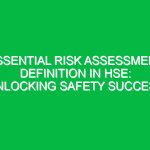Introduction
Hello team! Today, we’re gathering for a vital toolbox talk focused on an essential aspect of our working lives: safety. More specifically, we’re going to discuss the Three Self-Centered Reasons to Work Safely. While Safety is often viewed through the lens of collective responsibility, it’s crucial to recognize how individual choices impact personal well-being. Understanding these self-centered reasons can encourage us all to adopt better Safety practices, ultimately benefiting everyone in the workplace.
Why Focus on Self-Centered Reasons?
Before we dive into specific reasons, let’s acknowledge why self-centered reasons can be powerful motivators. When individuals recognize the personal Benefits of safe work practices, they are more likely to engage with safety protocols. This approach not only enhances personal well-being but also fosters a culture of safety that extends to the entire team. So, let’s get into the three self-centered reasons to work safely.
Reason 1: Protecting Your Health and Well-Being
The first and most obvious reason to work safely is to protect your health and well-being. Every time we step into the workplace, we face various risks, from slips and falls to exposure to hazardous materials. By prioritizing safety, you’re actively reducing your chances of injury or illness.
Real-Life Scenario
Imagine a scenario where you’re lifting a heavy object without proper technique. Ignoring Safety Measures may lead to a back injury, which could take weeks or even months to heal. During that time, you might miss work, experience pain, and incur medical expenses—all of which could have been avoided by simply using proper lifting techniques or asking for help.
Best Practices for Health and Well-Being
- Use Proper Equipment: Always wear Personal Protective Equipment (PPE) relevant to your tasks.
- Follow Safety Protocols: Adhere to established safety Procedures, especially when operating machinery.
- Take Breaks: Regular breaks can prevent fatigue and reduce the risk of accidents.
Reason 2: Preserving Your Financial Stability
The second self-centered reason to work safely revolves around financial stability. Accidents can lead to significant financial burdens, both for you and your employer. Injuries can result in medical bills, lost wages, and even legal repercussions if safety Regulations are violated.
Understanding the Financial Implications
Consider this: if you sustain an injury that prevents you from working for a few weeks, your paycheck will be affected. Additionally, if the injury was due to negligence, you might face costs related to legal claims or damages. By working safely, you protect not just your health but also your financial future.
Financial Safety Tips
- Report Hazards: Don’t ignore safety Hazards; report them to management to prevent accidents.
- Participate in Safety Training: Engage in training sessions to stay informed about Best Practices and new regulations.
- Understand Workers’ Compensation: Familiarize yourself with your rights and benefits under workers’ compensation laws.
Reason 3: Enhancing Your Reputation and Career Prospects
The third self-centered reason to work safely is related to your reputation and career advancement. In a workplace setting, being known as someone who prioritizes safety can enhance your standing among peers and supervisors.
The Impact of Your Reputation
When you consistently exhibit safe work practices, your colleagues and supervisors will notice. This can lead to opportunities for promotions, raises, or even leadership roles within safety committees. Companies value employees who demonstrate responsibility and care for their own well-being and that of their coworkers.
Strategies to Enhance Your Safety Reputation
- Be Proactive: Take the initiative to educate others about safety practices.
- Lead by Example: Model safe behaviors in your daily work routines.
- Engage in Safety Discussions: Participate in safety meetings and share your insights.
Addressing Potential Hazards
Now that we’ve discussed the three self-centered reasons to work safely, it’s essential to address some potential hazards you might encounter on the job. Being aware of these risks enables you to take proactive measures to protect yourself.
Common Workplace Hazards
- Slips, Trips, and Falls: Often caused by wet floors or cluttered walkways.
- Electrical Hazards: Improperly maintained equipment can lead to shocks or Fires.
- Manual Handling Injuries: Lifting heavy objects improperly can cause musculoskeletal injuries.
Actionable Advice for Safety
To further enhance our safety culture, here are some actionable pieces of advice you can incorporate into your daily routines:
- Conduct Daily Safety Checks: Before starting your tasks, assess your work area for potential hazards.
- Communicate: Talk to your coworkers about safety concerns and encourage an open dialogue.
- Stay Informed: Keep updated with Safety Guidelines and protocols relevant to your work Environment.
Open-Ended Discussion
Let’s take a moment to discuss. Can anyone share a time when focusing on safety made a difference in their workday? What strategies do you find most effective in ensuring your own safety and the safety of your coworkers?
Regulations and Standards
It’s also essential to understand the regulations and standards that govern Workplace Safety. Compliance with Occupational Safety and Health Administration (OSHA) guidelines and company policies isn’t just a legal obligation—it’s a commitment to your safety and the safety of those around you.
Understanding Compliance
Non-compliance can lead to serious consequences, including fines and legal action against the company. More importantly, neglecting safety regulations can result in preventable injuries. By adhering to these standards, you not only protect yourself but also contribute to a safer workplace for everyone.
Conclusion
In summary, the Three Self-Centered Reasons to Work Safely—protecting your health and well-being, preserving your financial stability, and enhancing your reputation—are crucial motivators for adopting Safe Practices. By understanding the personal benefits of safety, we can create a culture of safety that extends beyond individual concerns to encompass the entire team.
Thank you all for your attention and commitment to safety. Remember, the choices you make today can have a lasting impact on your health, finances, and career. Let’s continue to prioritize safety in everything we do!


